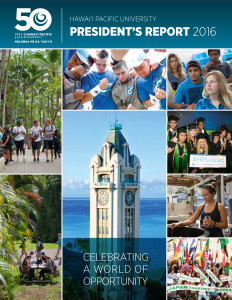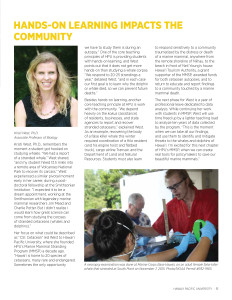Kristi West, Ph.D., and HPU’s Marine Mammal Stranding Program Study How to Save Hawai’i’s Dolphins and Whales
Kristi West, Ph.D., remembers the moment a student got hooked on studying whales. “We had a report of a stranded whale,” West shared, “and my student hiked 13.5 miles into a remote area of Volcanoes National Park to recover its carcass.” West experienced a similar pivotal moment early in her career, during a post-doctoral fellowship at the Smithsonian Institution. “I expected it to be a dream appointment, working at the Smithsonian with legendary marine mammal researchers Jim Mead and Charlie Potter. But I didn’t realize I would learn how great science can come from studying the corpses of stranded Cetaceans (whales and dolphins).”
Her focus on what could be described as “CSI: Cetacean” led West to Hawai‘i Pacific University, where she founded HPU’s Marine Mammal Stranding Program (MMSP) a decade ago. “Hawai’i is home to 20 species of cetaceans, many rare and endangered. Sometimes the only opportunity we have to study them is during an autopsy.” One of the core teaching principles of HPU is providing students with hands-on learning, and West points out that it does not get more hands-on than studying a whale corpse. “We respond to 20-25 strandings a year,” detailed West, “and in each case our first goal is to learn why the dolphin or whale died, so we can prevent future deaths.”
Besides hands-on learning, another core teaching principle at HPU is work with the community. “We depend heavily on the kokua (assistance) of residents, businesses and state agencies to report and recover stranded cetaceans,” explained West. As an example, recovering the body of a false killer whale this winter required coordination of a Hilo resident (and his engine hoist and flatbed truck), cargo airline Transair, and the Department of Land and Natural Resources. Students must also learn to respond sensitively to a community traumatized by the distress or death of a marine mammal, anywhere from the remote shoreline of Niihau, to beach in front of Neil Young’s house. Hawai’i Tourism Authority, a grant supporter of the MMSP, awarded funds for both cetacean autopsies, and to return to educate and report findings to a community touched by a marine mammal death.
The next phase for West is a year of professional leave dedicated to data analysis. While continuing her work with students in MMSP, West will use time freed up by a lighter teaching load to analyze ten years of data collected by the program. “This is the moment when we can take all our findings, and use them to identify and mitigate threats to the whales and dolphins of Hawai’i. I’m excited for this next chapter of HPU’s MMSP, when we can create real tools for policymakers to save our beautiful marine mammals.”
This story originally appeared in the HPU 2016 President’s Report.


